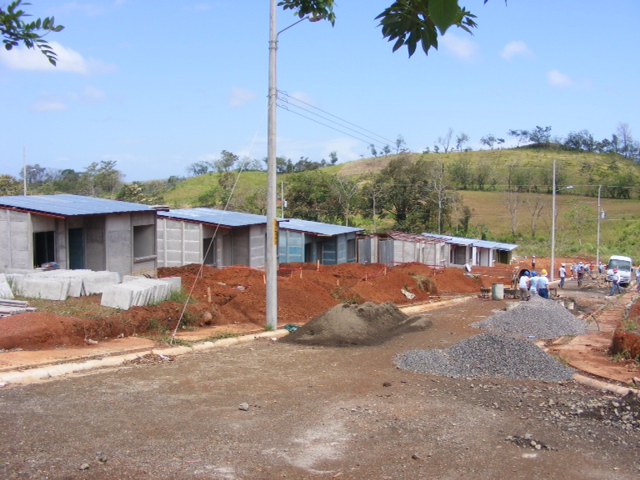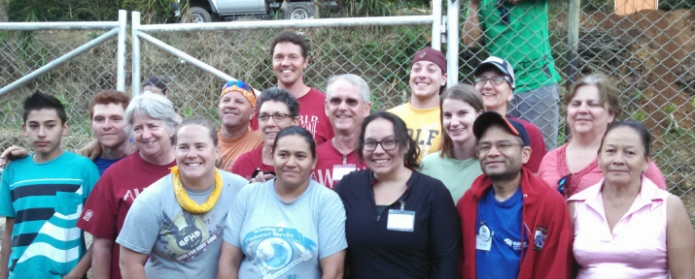Costa Rica March 2012: Let the Construction Begin!
Our team was itching to get started today! After two days of travel, orientation, leisure, team building and huge meals, we couldn’t wait to begin...
Thursday, January 28, 2010
Today we had a very aggressive itinerary—4 meetings back to back, scattered throughout the city with Guatemalan agencies involved in housing issues. We left the hotel at 8:30am to meet with representatives from FOGUAVI, the Communication Ministry and UDEVIPO. Several of Habitat Guatemala’s Board members joined us for this meeting and we were glad they did.
FOGUAVI and the Communications Ministry are responsible for, among other things, managing the upkeep of roads, airports, ports, and housing. As we soon realized, this is a lot of responsibility for one agency and that is indeed what they alluded to during the meeting. They talked about the importance of creating a cabinet level ministry of housing that will be able to dedicate more time and resources to the housing issues in Guatemala. This is something that is currently being discussed by the federal government in Guatemala (a bill has been introduced in congress that would create such a position) and seems to have the support of most people we talked with over the past week.
During this meeting, Habitat Guatemala Board members petitioned the officials present to make it easier for Habitat Guatemala to obtain the title to the land they build on and a housing subsidy before they break ground on a project (like most Habitat affiliates, Habitat Guatemala must have title to the land before they start construction of a house to ensure that the family has secure land tenure). The representatives indicated that their current practice is to transfer title and the housing subsidy to the family after the project is complete (as we learned, once the projects are complete, often times the title and housing subsidy that is promised does not follow.) Thus, you can see the importance of receiving these before the start of the project. Fortunately, the agency representatives agreed to grant Habitat’s request and transfer the title and subsidy before the beginning of the projects.
Shortly after the meeting, I overheard a few of the Habitat Guatemala staff members and board members discussing the importance of quickly signing an agreement or a memorandum of understanding of some sort so that these officials do not go back on their word. There was some skepticism but some within the group felt like this was a positive sign and at the very least gave them a chance to formalize a partnership between Habitat Guatemala and these housing organizations. It appeared that our meeting had gotten the ball rolling and there was hope that the housing subsidies FOGUAVI would provide would enable Habitat Guatemala to reach a more vulnerable and poorer demographic than they are currently able to serve.
Over lunch we met an NGO (non government agency) called IDESAC which stands for institute for economic development of central America (and I thought just Americans were obsessed with acronyms!). This organization seems as though it is Habitat’s long lost brother. They talked about a central component of their program called ayuda mutua (sweat equity) which is also a vital part of Habitat’s program. This essentially means that the families involved in the program have to contribute a certain number of hours in to helping build their own house as well as to help build the houses of the community around them. They are set up as a cooperative that fosters a cohesive and tight-knit community. Though this model is different than Habitat’s, its end goals are very comparable. It is great to know about other NGOs working to address the housing issues in Guatemala—as we know, Habitat is not able to solve all of the world’s housing problems all by themselves. I think what also made this meeting so enjoyable was the fabulous spread of food they served us (warm tortillas, beans, chicken, guacamole, and delicious horchata). We were treated like royalty!
After lunch we met with FONAPAZ (fondacion nacional para la paz—national foundation for peace). This agency was created to serve the families affected by the civil war that took place from 1962- the mid 1990’s. Their mission too is quite broad (focusing on education, sanitation and water, rural roads, housing, and health). It was apparent from the start of the meeting (which due to some apparent miscommunication started about an hour and a half late) that FONAPAZ did not fully understand what Habitat does and how it is structured. As a glass-half-full kind of person, I saw this as simply a great opportunity for us to educate them about our work and to find out how our two organizations can work together to address housing issues. The director of FONAPAZ (who looked like he could be a relative of former Twin Johan Santana…you will have to excuse me, the weather down here makes me think that spring training is just around the corner) seemed genuinely interested in our work and appeared confident that we could work together on projects both in Guatemala City and other rural parts of the country too.
I am not entirely sure what outcomes we anticipated from these meetings, but I think it is safe to say that we felt positive about the outcomes. The housing officials took the time to get to know our work and it appeared that somewhere down the road the fruits of these meetings may be realized in the creation of a housing ministry, or simplifying the land title process, or securing housing subsidies for Habitat to reach the people living in extreme poverty here in Guatemala. We may not know tomorrow whether any of this happens, but Habitat Guatemala staff assured us that these meetings will make it easier for them to pick up the phone and set up a time for future meetings.
Tomorrow we will be hosting a housing forum with more Guatemalan housing officials. This should be exciting since we will be bringing together a number of different housing organizations that rarely are sitting in the same room talking about solutions to housing issues in Guatemala. Check back tomorrow to hear more about that discussion.
View our pictures on Flickr at http://bit.ly/8qRili
Your gift unlocks bright futures! Donate now to create, preserve, and promote affordable homeownership in the Twin Cities.

Our team was itching to get started today! After two days of travel, orientation, leisure, team building and huge meals, we couldn’t wait to begin...
An intergenerational group of volunteers from the Twin Cities will build Habitat homes in La Cruz Costa Rica between March 10-19. Twin Cities Habitat...

Guest Blog by Debbie Campbell, Habitat Global Village Team Member